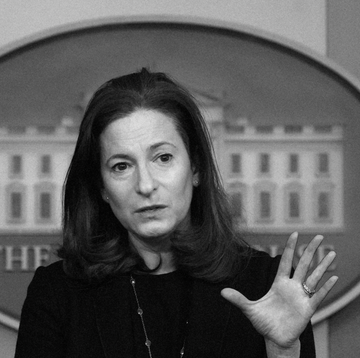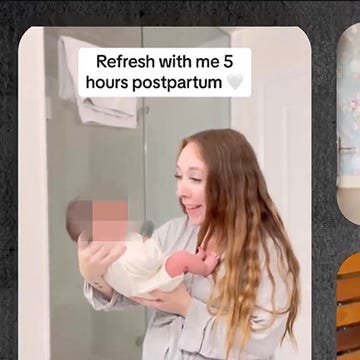For people undergoing fertility care in Alabama, it’s been a week of chaos, tears, angry emails, and confusion after the state Supreme Court ruled earlier this month that their embryos are legally considered “children."
The ruling means that, for now, embryos in Alabama created via in vitro fertilization (IVF)—an already emotional, physically grueling, and expensive pathway to parenthood—are frozen in time, figuratively and literally. Because of the legal implications, many IVF clinics have closed their doors. Doctors aren't creating new embryos or completing transfers of fertilized eggs to a patient's uterus, out of fear that they could be liable for “wrongful death,” per the decision in Burdick-Aysenne v. Center for Reproductive Medicine (a case brought by three couples whose frozen embryos were accidentally destroyed by an unauthorized person in the clinic’s lab). Moreover, IVF could be in jeopardy even beyond the Yellowhammer state, says Barbara Collura, the CEO of RESOLVE: The National Infertility Association. On Wednesday, Republicans in the U.S. Senate blocked a bill that would establish federal protections for IVF.
Although the state legislature is considering proposals to protect IVF, the ruling has upended the lives of people with embryos in Alabama. That includes those who have struggled with infertility for years, members of the LGBTQ+ community for whom IVF is the only path to biological children, and patients who have undergone cancer treatments and cannot conceive on their own. These are people who know better than anyone that their embryos aren’t “extrauterine children.” What they want most in the world are kids of their own.
For now, Alabamians with embryos must make time-sensitive, life-changing decisions. Cosmopolitan asked some of them about the ruling’s warped logic, its emotional impact, and what options they're exploring next.
Caroline Veazey, 30, is desperately trying to get her embryos out-of-state.
I woke up last Friday and typed into Google: “how to ship embryos out of state.” I knew it was not going to be pretty. It had cost so much to ship one vial of sperm—almost $2,000—which I’d used when I first decided to freeze my eggs and create embryos a few years ago. As a woman who identifies as a lesbian, I always knew the earlier I started the IVF process, the better, if I wanted to be a biological parent.
While I started my IVF journey on my own when I was single, my now-fiancée Kandis and I wanted to wait to use the embryos until we were married and had full financial stability, whatever that means. When I realized the consequences of this ruling, I called my clinic and asked, "Do I need to get pregnant right now?" At this point, I would get an embryo transfer today if I had to. My embryos are extremely important to me, so I’m going to do everything in my power to protect them and not let Alabama make them their property. What gets me is, I can't fully control a growing embryo when it’s in my uterus, and now I also can't control embryos that are in a freezer.
The ruling is dumbfounding. I didn’t freak out until last Thursday, when a second Alabama clinic shut down. The process of trying to move the embryos has been a nightmare. We made all these calls, sent so many emails, and finally got ahold of this very kind person at an embryo transfer company. We scrambled to finish the paperwork, and they said we’d be prioritized. The next day, Friday, at 3:12 p.m., we got an email saying they’d paused shipping in and out of Alabama. Then, Monday, they said they were back on board and would help us ship them. It was a rollercoaster.
We’ve now found three companies that said they’d be willing to get our embryos out of Alabama. The new challenge is my clinic, the Alabama Center for Reproductive Medicine in Birmingham, won’t allow my embryos to be released. They won’t move embryos out of the facility until they get the okay from their liability insurers and attorneys. They’re holding them hostage.
In the meantime, I started a GoFundMe. I knew it would be costly to ship my embryos to a non-red state, pay for insurance, shipping fees, and multiple tanks for the embryos so they aren’t all in one place if something happens in transport. At this point, even if a law is passed to protect IVF in Alabama, I’ll still move the embryos out of state.
Still, I’ve sent 67 personalized emails to each of my legislators in the last week. My dad told me: “Sissy, you should run for office.” He’s 84, and only somewhat understands IVF, but he’s been texting me constantly and has supported me since the start of this journey. He’s the most accepting person in my life. That’s a big deal, because not everyone has been since I came out.
My dad loves me in a way that I cannot even comprehend. I just want a baby so bad that I can support without limitations. It’s never going to be conditional love—it’s going to be actions and words. I want to be the person to my child that my dad has been for me. —Birmingham, AL
Brook, 43, spent $10,000 on fertility treatments in the last year only to have her transfer canceled.
On Friday, I had an appointment to transfer an embryo into my uterus in Alabama. It was only that Thursday morning that I learned about the Supreme Court ruling. We honestly didn’t think it would affect us. We tried to call the clinic, but we couldn’t get anyone on the phone for a while. Then at about 9:30 a.m. that morning, my doctor called to say we had to cancel our transfer, due to the legal repercussions of proceeding with IVF.
She said, “I think you know why I'm calling,” and I just burst into tears. It hit me really hard. I was grieving for me, for the doctors, and all the other IVF patients that are going through this. I just can’t imagine all the calls my doctor had to make, and she started crying on the phone with me.
Even though the appointment was canceled, I kept taking the medicine that helps prepare your body for the transfer through the rest of Thursday. I hoped some kind of miracle would happen overnight. But Friday morning hit, and there was no change. I stopped the medication completely.
It was frustrating and devastating, because timing matters so much in this process. We’d already had to cancel a transfer in January because we all got COVID. We did one transfer in November, but we found out that it didn’t work. We’ve put about $10,000 into fertility in the last year, and we have a $3,500 credit waiting with our clinic because of the transfer we had to cancel. Overall, we’ve spent much more, as we did an egg retrieval and our first round of IVF in 2018. That process brought us our beautiful son, as well as eight other embryos.
I love my embryos and I’m attached to them—in some ways I do feel like they’re my babies. At the same time, ruling that they’re “children” is absurd. They can be frozen and thawed—you can’t freeze a baby. It’s all been so confusing. From what I understand, they had to stop IVF because some embryos don’t make it through the thaw when they come out of the freezer before being transferred. And the ruling says that would be considered wrongful death. That feels so wrong to me. As I learned when my transfer didn’t take this fall, sometimes these things just don’t work and it’s nobody’s fault. But you have to let people keep trying. —Birmingham, AL
Megan Legerski, 37, would consider leaving the state because of this.
When I first read about the IVF ruling, I was absolutely outraged on behalf of the intended IVF parents in the lawsuit who lost their embryos. I understood better than the average person just how awful that would feel. What I didn’t realize at first, though, was how much this outcome would mean for me personally. We have three embryos in Alabama. Not three children.
One in five pregnancies ends in a miscarriage, and there are all sorts of other ways embryos don’t make it to a live birth. That has become even more clear to me after having two miscarriages. I see those embryos as a chance of having children. They are groups of cells. They cannot support themselves without being transferred into my uterus on exactly the right day of my cycle, when my body’s been prepared to care for them and grow them. Embryos need tools. But now, they’ve taken away our ability to give them the tools to survive. We want to give these embryos a chance at life and, and we are so ready for that.
Our embryos are actually one of the things that have kept us in Alabama. We’ve talked about moving to one of our home states, Colorado or Wisconsin, but since we started this process here, we wanted to stay until we saw it through. Now, we would consider leaving the state earlier than anticipated. If we need to move our embryos out of the state, we’ll also move ourselves. I really believe this will be one more contributor to “brain drain” out of Alabama because it won’t just be us.
I don’t know what will happen, what will change. But I can tell you, there’s been a lot of anxiety and unease over the last few weeks. —Tuscaloosa, AL
Rebecca Mathews, 36, is a Christian who believes this ruling is deeply wrong.
A few years ago, my husband and I were going through IVF to try for our second child, and I had multiple miscarriages. I’m a Christian, and my faith is part of what got me through all of the pregnancy loss and our infertility journey in general.
I value life. I value the Bible and its teachings. But at the end of the day, our country wasn't founded on religion—we have the separation of church and state for a reason. It's not my place to tell another person what they can or cannot do with their embryo or with their body.
This ruling, and what it’s saying about life, is wrong. We’ve transferred 12 embryos, and I’ve had multiple miscarriages. I would never say to someone that I’ve had 11 children die. We already have to protect our hearts through IVF and infertility—it’s hard enough—and to think about it as though I’ve lost 11 living and breathing children? It’s too much, and it’s, frankly, not scientific.
I have two children and I have one frozen embryo in Alabama. If the fertility clinic caught on fire and my children and my embryo were in separate rooms, I’m going to save my children before I save that embryo.
Meanwhile, the people who made this decision are men who will never carry a child in their lives. The fact that men make these decisions for women, and now for families, is just absolutely insane and unfair. I’ve live-streamed the voting on the House and Senate floors since 9 a.m. this morning. I’ve watched lawmaker after lawmaker debate this topic, and not one has been directly affected by infertility or IVF that I know of. There are a lot of opinions about something they will never know, deeply and personally.
Such decisions are just getting worse and worse. What's gonna happen next? Is it going to be that eggs are gonna be humans? Eventually, we're gonna have to start standing up and saying no. —Montgomery, AL
These interviews have been condensed for length and clarity.
Molly is an investigative and freelance journalist who loves to tell stories at the intersection of health and politics. Molly enjoys hiking, public records, and looking at cow videos on Instagram. She's originally from Sidney, Iowa.














